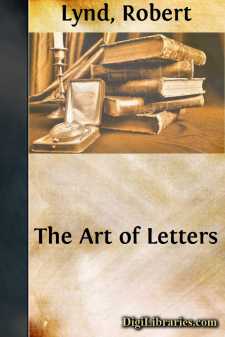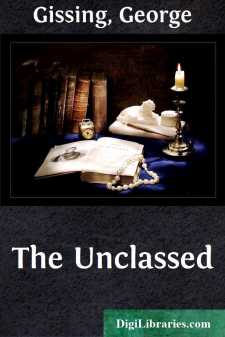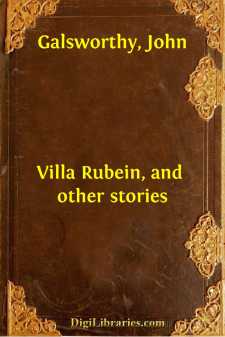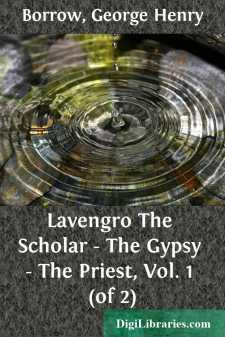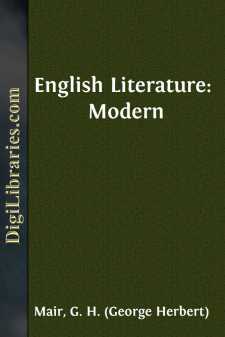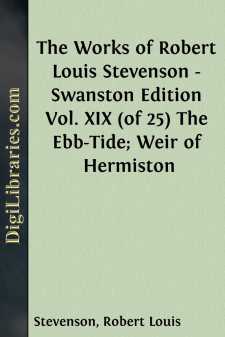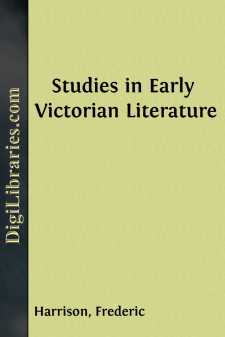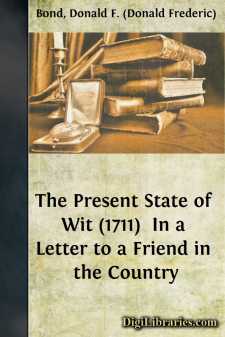Literary Collections
- American 84
- Ancient, Classical & Medieval 14
- Asian 1
- Australian & Oceanian 1
- Canadian 55
- Continental European 121
- English, Irish, Scottish, Welsh
- Essays 160
- General 24
- Letters 46
- Middle Eastern 1
English, Irish, Scottish, Welsh Books
Sort by:
by:
Robert Lynd
I.—Mr. Pepys Mr. Pepys was a Puritan. Froude once painted a portrait of Bunyan as an old Cavalier. He almost persuaded one that it was true till the later discovery of Bunyan’s name on the muster-roll of one of Cromwell’s regiments showed that he had been a Puritan from the beginning. If one calls Mr. Pepys a Puritan, however, one does not do so for the love of paradox or at a guess. He tells...
more...
CHAPTER I. The moon had newly risen, a late October moon, a pale almost imperceptible crescent, above the dark pine spires in the thicket through which Roderick Vawdrey came, gun in hand, after a long day's rabbit-shooting. It was not his nearest way home, but he liked the broad clearing in the pine wood, which had a ghostly look at dusk, and was so still and lonely that the dart of a squirrel...
more...
by:
George Gissing
SCHOOL There was strange disorder in Miss Rutherford's schoolroom, wont to be the abode of decorum. True, it was the gathering-time after the dinner-hour, and Miss Rutherford herself was as yet out of sight; but things seemed to be going forward of a somewhat more serious kind than a game of romps among the children. There were screams and sobbings, hysterical cries for help; some of the little...
more...
by:
John Galsworthy
CHAPTER I Mayday afternoon in Oxford Street, and Felix Freeland, a little late, on his way from Hampstead to his brother John's house in Porchester Gardens. Felix Freeland, author, wearing the very first gray top hat of the season. A compromise, that—like many other things in his life and works—between individuality and the accepted view of things, aestheticism and fashion, the critical sense...
more...
by:
John Galsworthy
PREFACE Writing not long ago to my oldest literary friend, I expressed in a moment of heedless sentiment the wish that we might have again one of our talks of long-past days, over the purposes and methods of our art. And my friend, wiser than I, as he has always been, replied with this doubting phrase "Could we recapture the zest of that old time?" I would not like to believe that our faith in...
more...
There have been many Romany Ryes, or “Gypsy Gentlemen,” as Gypsies designate those who, though not of their race, yet have loved that race, and have mastered the Romany tongue. The first is one of the oddest—Andrew Boorde (c. 1490-1549). Carthusian, traveller, physician, and, perhaps, the original Merry Andrew, he got into trouble over certain delinquencies, and died a prisoner in the Fleet...
more...
CHAPTER I THE RENAISSANCE (1) There are times in every man's experience when some sudden widening of the boundaries of his knowledge, some vision of hitherto untried and unrealized possibilities, has come and seemed to bring with it new life and the inspiration of fresh and splendid endeavour. It may be some great book read for the first time not as a book, but as a revelation; it may be the first...
more...
CHAPTER I NIGHT ON THE BEACH Throughout the island world of the Pacific, scattered men of many European races, and from almost every grade of society, carry activity and disseminate disease. Some prosper, some vegetate. Some have mounted the steps of thrones and owned islands and navies. Others again must marry for a livelihood; a strapping, merry, chocolate-coloured dame supports them in sheer...
more...
CHARACTERISTICS OF VICTORIAN LITERATURE That which in England is conveniently described as the Victorian Age of literature has a character of its own, at once brilliant, diverse, and complex. It is an age peculiarly difficult to label in a phrase; but its copious and versatile gifts will make it memorable in the history of modern civilisation. The Victorian Age, it is true, has no Shakespeare or...
more...
INTRODUCTION Gay's concern in his survey of The Present State of Wit is with the productions of wit which were circulating among the coffee-houses of 1711, specifically the large numbers of periodical essays which were perhaps the most distinctive kind of "wit" produced in the "four last years" of Queen Anne's reign. His little pamphlet makes no pretence at an analysis of true...
more...


